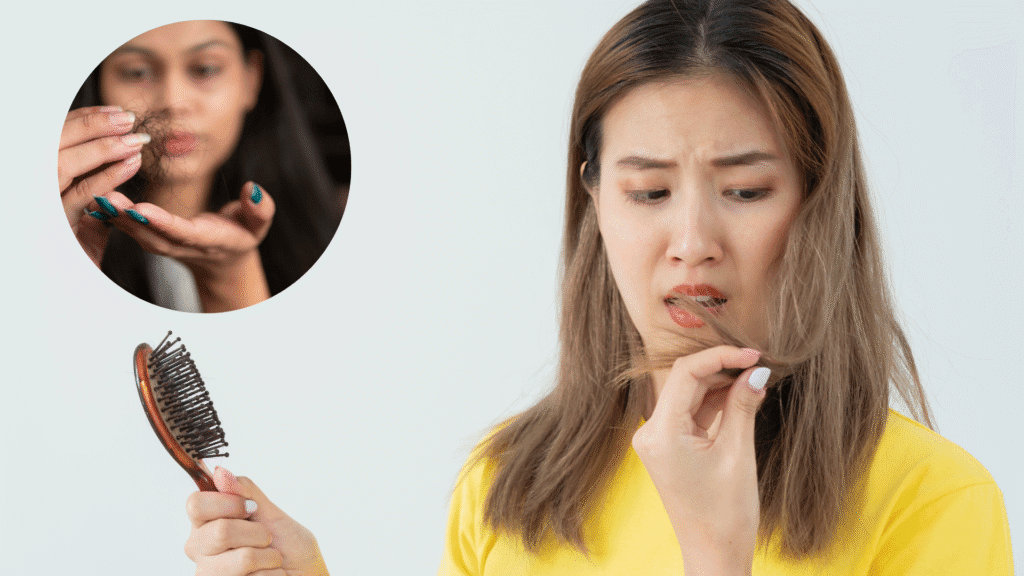
Recovering from an illness or fever is already physically exhausting — and if you’ve noticed excessive hair fall weeks after recovery, you’re not alone. Many people experience sudden hair shedding after recovering from viral infections, high fever, COVID-19, dengue, typhoid, or even seasonal flu. But why does this happen, and more importantly, how can you stop it?
In this blog, we explain the causes of post-illness hair fall and share effective remedies to restore hair health.
Why Does Hair Fall After Illness or Fever?
The most common reason for hair fall after illness is a condition called Telogen Effluvium. This occurs when a physical or emotional stress (such as fever, infection, surgery, or trauma) pushes a large number of hair follicles into the resting (telogen) phase of the hair cycle. Within 1–2 months, these hairs begin to shed — resulting in noticeable hair thinning.
Common Triggers Include:
High-grade fever
Viral infections (e.g., COVID-19, dengue)
Typhoid, malaria, flu
Antibiotic or steroid medications
Nutritional deficiencies during recovery
Emotional stress or fatigue
How to Identify Post-Illness Hair Fall?
Here are key signs that your hair fall is linked to a recent illnes
Excessive hair shedding (especially while combing or washing)
Visible thinning on the scalp
Hair fall starts 4–8 weeks after recovery
No signs of dandruff or scalp infection
General hair fall rather than patchy or localized loss
What to Do to Control Hair Fall After Fever or Illness?
Here are proven tips to control and reverse post-fever hair loss:
1. Eat a Nutrient-Rich Diet
Focus on foods that are rich in:
Iron (spinach, dates, legumes)
Protein (eggs, dairy, dals)
Vitamin B12 & Biotin (nuts, seeds, milk)
Zinc (pumpkin seeds, whole grains)
Vitamin D (sunlight, fortified foods)
2. Take Hair-Boosting Supplements
Ask your doctor or dermatologist about supplements like:
Biotin
Zinc
Iron
Vitamin D3
Ayurvedic hair growth tonics
3. Use Mild, Herbal Hair Products
Avoid harsh shampoos or chemical treatments. Instead, use products that contain:
Bhringraj
Amla
Brahmi
Shikakai
Onion Extract
These herbs strengthen roots and nourish the scalp naturally.
4. Scalp Massage & Oil Therapy
Weekly oil massages using Ayurvedic oils (like Bhringraj oil, coconut oil with herbs) can stimulate blood circulation and boost new hair growth.
5. Stay Hydrated & Manage Stress
Drink 2–3 liters of water daily and engage in stress-relieving practices like yoga, meditation, and regular sleep.
6. Be Patient
Telogen effluvium is temporary. Once your body recovers and nutrients are restored, hair fall slows down and regrowth begins within 3–6 months.
Dermatologist’s Advice
“Post-illness hair fall is common and usually reversible. Avoid panicking or switching to harsh chemical products. Instead, support your body’s natural recovery process through nutrition, proper scalp care, and stress management.”
What to Avoid
Frequent hair styling or coloring
Overwashing or using hot water on the scalp
Applying unknown hair serums or DIY remedies without expert guidance
Ignoring your nutrition and hydration
Ayurvedic & Natural Remedies for Hair Regrowth
You can also try natural remedies such as:
Fenugreek (methi) paste
Aloe vera gel on scalp
Onion juice (twice a week)
Ayurvedic hair tablets and tonics
Always consult a qualified practitioner before starting Ayurvedic supplements.
Final Thoughts
Hair fall after illness or fever is a natural response to body stress — but the good news is, it’s temporary and reversible. With the right care, balanced nutrition, and patience, your hair will regain its strength and shine. If hair fall continues beyond 3–4 months or becomes severe, consult a dermatologist for a personalized treatment plan.

